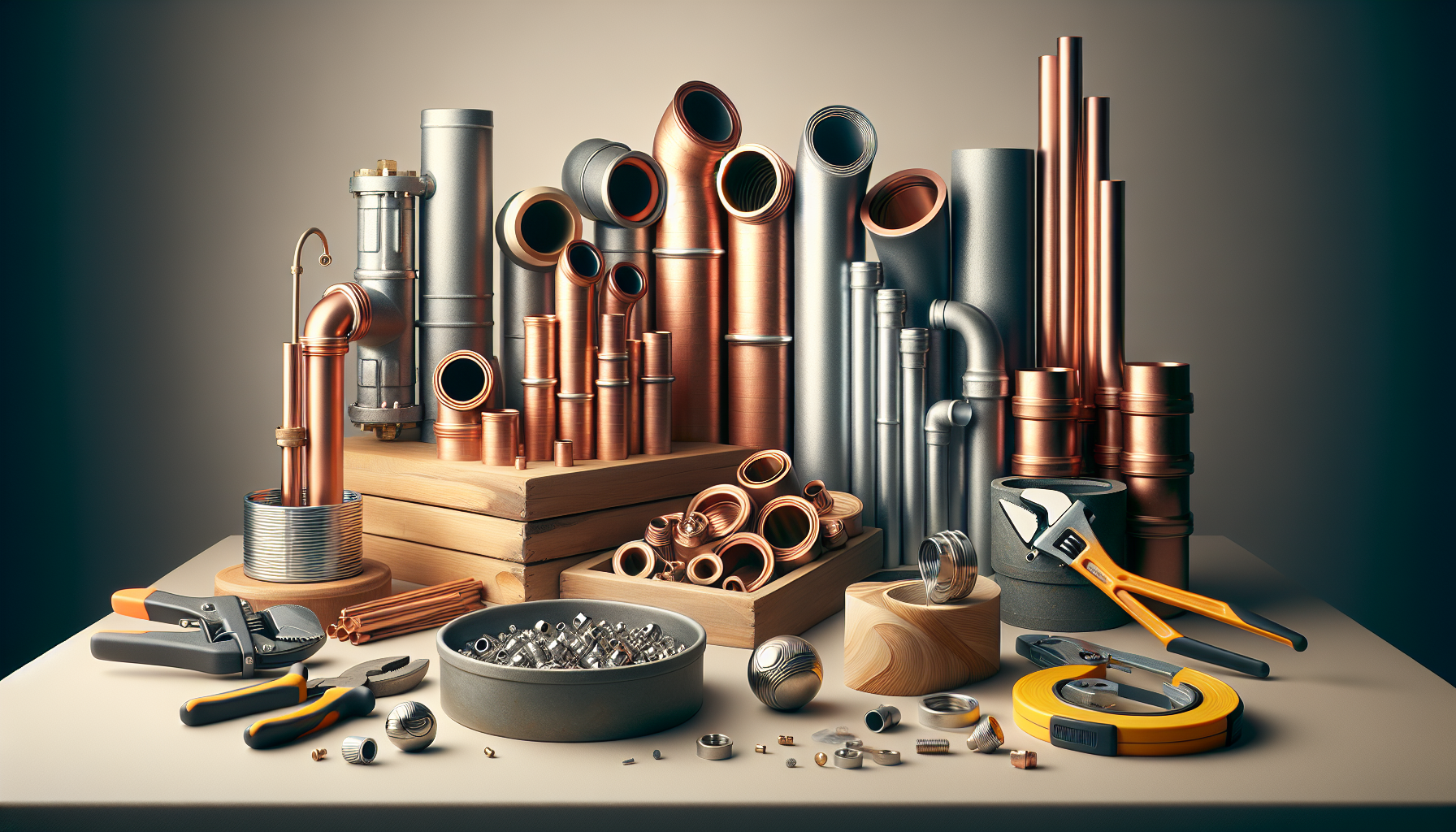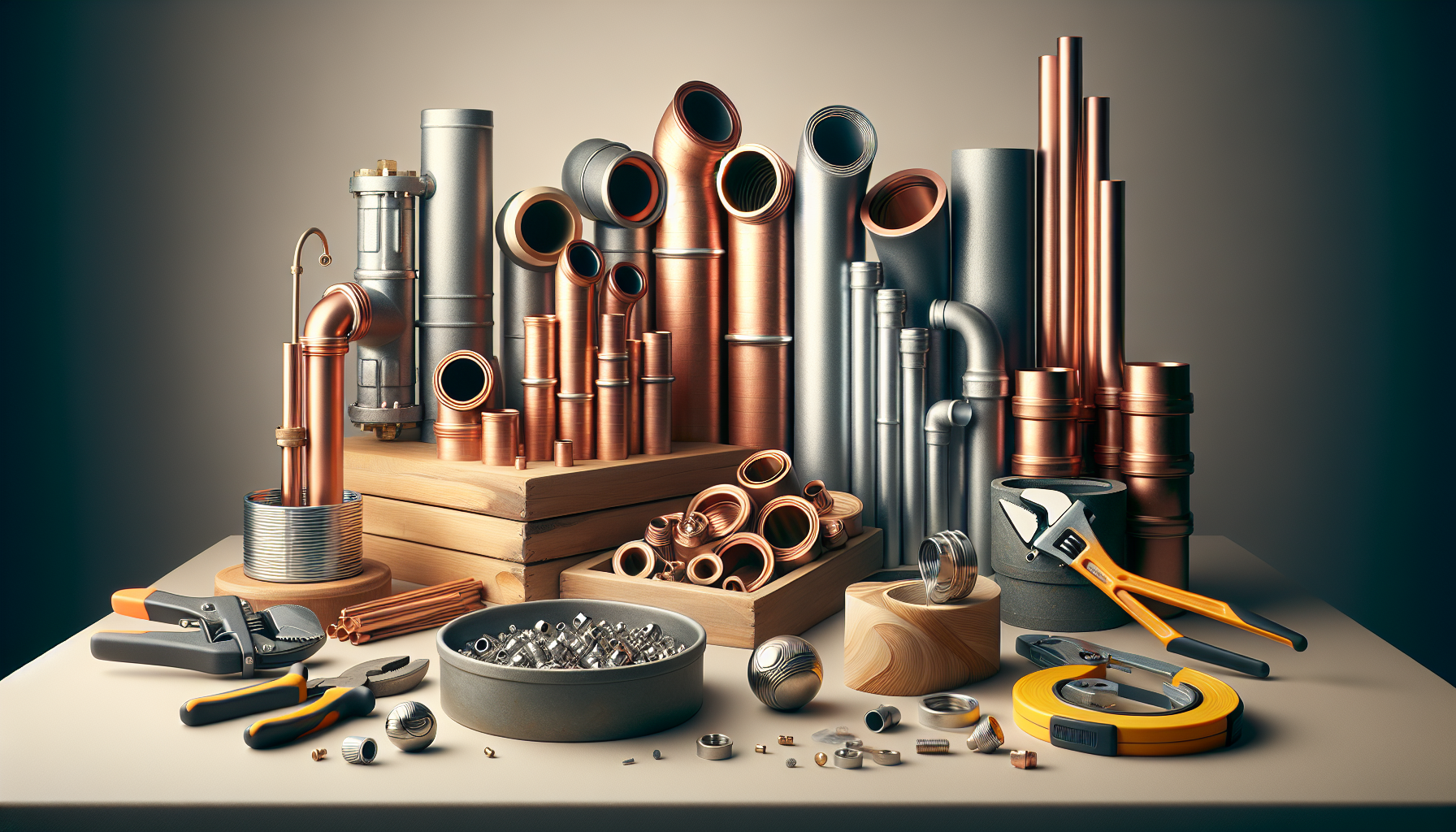When it comes to choosing plumbing materials for your home, durability and longevity are key factors to consider. The right plumbing materials can ensure that your pipes and fixtures stand the test of time, minimizing the need for costly repairs or replacements down the line. In this article, we will explore some helpful tips and considerations to help you choose plumbing materials that are built to last, allowing you to enjoy a reliable and efficient plumbing system for years to come.

1. Consider the Water Quality
– Test the water quality
When choosing plumbing materials, one of the first factors you need to consider is the quality of the water that will be flowing through your pipes. Conducting a water quality test will give you valuable information about the composition of the water, including the presence of contaminants or minerals. Testing the water quality will help you identify any potential issues that may affect the performance and lifespan of your plumbing system.
– Determine the pH level
Another important aspect of water quality to consider is the pH level. The pH level of water can vary, and certain plumbing materials may react differently to water with varying pH levels. Understanding the pH level of your water will help you choose plumbing materials that are compatible and less likely to corrode or deteriorate over time.
– Check for mineral content
Minerals in water, such as calcium and magnesium, can lead to mineral deposits and scaling in your plumbing system. Over time, these deposits can restrict water flow and cause damage to your pipes. Checking for mineral content in your water will allow you to select materials that are resistant to mineral buildup and reduce the need for frequent maintenance or replacement.
2. Assess the Material Compatibility
– Understand the properties of different materials
Before making a decision on which plumbing materials to use, it is crucial to understand the properties of different materials. Each material has its own strengths, weaknesses, and compatibility with other materials. By familiarizing yourself with these properties, you can choose materials that will work well together and ensure the longevity of your plumbing system.
– Consider the application of the plumbing system
The intended application of your plumbing system is another factor to consider when assessing material compatibility. For example, if you are installing plumbing in a residential property, you may have different requirements compared to a commercial or industrial plumbing system. The materials you choose should be suitable for the specific application to ensure optimal performance and durability.
– Ensure compatibility between materials
It is important to ensure compatibility between the different materials used in your plumbing system. Some materials may react or corrode when they come into contact with certain substances, leading to leaks or damage. By selecting materials that are compatible with each other, you can minimize the risk of such issues and ensure the longevity of your plumbing system.
3. Evaluate the Durability Factors
– Determine the lifespan of the materials
Durability is a key consideration when choosing plumbing materials. You want materials that can withstand the test of time and require minimal maintenance or replacement. Evaluate the projected lifespan of the materials you are considering to ensure they will meet your long-term needs.
– Consider the environmental conditions
The environmental conditions in which your plumbing system will be installed and used can greatly impact its durability. Factors such as temperature, humidity, and exposure to corrosive substances can all influence the longevity of the materials. Take into account the specific environmental conditions of your location and choose materials that are suitable for those conditions.
– Assess the corrosion resistance
Corrosion is a common issue in plumbing systems and can significantly affect the durability of the materials. Assess the corrosion resistance of the plumbing materials you are considering and choose options that have been proven to withstand corrosion over time. This will help prevent leaks, deterioration, and costly repairs in the future.
4. Examine the Cost and Budget
– Determine the initial cost
When choosing plumbing materials, it is important to consider the initial cost of the materials. Some materials may be more expensive upfront but offer greater durability and longevity, while others may be cheaper but require more frequent maintenance or replacement. Evaluate your budget and weigh the initial cost against the long-term benefits to make an informed decision.
– Consider maintenance and repair costs
In addition to the initial cost, it is crucial to consider the ongoing maintenance and repair costs associated with different plumbing materials. Some materials may require regular inspections, cleaning, or treatments to maintain their performance and durability. Take into account these additional costs when making your decision.
– Evaluate long-term cost savings
While it may be tempting to choose cheaper materials to minimize upfront costs, it is important to look at the long-term cost savings. Materials that are more durable and require less maintenance or replacement will save you money in the long run. Consider the lifespan of the materials and the potential cost savings associated with reduced repairs or replacements when making your decision.

5. Research Common Plumbing Materials
– Copper pipes
Copper pipes are a popular choice for plumbing systems due to their durability, corrosion resistance, and ability to withstand high temperatures and pressure. They are known for their long lifespan and can be a reliable option for both residential and commercial plumbing systems. Copper pipes are also relatively easy to install and have good compatibility with other materials.
– PVC pipes
PVC (polyvinyl chloride) pipes are widely used in both residential and commercial plumbing systems. They are lightweight, inexpensive, and resistant to corrosion and chemical reactions. PVC pipes are easy to install and maintain, making them a convenient choice for many applications. However, they are not suitable for hot water systems and may become brittle over time.
– PEX pipes
PEX (cross-linked polyethylene) pipes have gained popularity in recent years due to their flexibility, durability, and resistance to freezing. They are suitable for both hot and cold water systems and have excellent corrosion resistance. PEX pipes are relatively easy to install and can be an efficient choice for residential plumbing systems. However, they may not be suitable for high-temperature applications.
6. Assess the Advantages and Disadvantages
– Copper pipes: advantages and disadvantages
Copper pipes offer many advantages, including excellent durability, corrosion resistance, and compatibility with other materials. They have a long lifespan and can withstand high temperatures and pressure. However, copper pipes can be expensive compared to other materials, and there is a risk of theft due to their scrap value.
– PVC pipes: advantages and disadvantages
PVC pipes are lightweight, inexpensive, and resistant to corrosion. They are easy to install and maintain, making them a popular choice for many applications. However, PVC pipes may become brittle over time and are not suitable for hot water systems. They may also release toxic chemicals when burned.
– PEX pipes: advantages and disadvantages
PEX pipes offer flexibility, durability, and resistance to freezing. They can be installed quickly and are suitable for both hot and cold water systems. However, PEX pipes may not be suitable for high-temperature applications and may be more susceptible to damage from UV exposure.
7. Consider the Application of the Plumbing System
– Residential plumbing
Residential plumbing systems have specific requirements for durability, compatibility, and cost-effectiveness. Materials that are suitable for residential plumbing should be able to withstand frequent use, provide reliable performance, and require minimal maintenance. Consider factors such as water usage, pressure, and temperature fluctuations when choosing materials for residential plumbing.
– Commercial plumbing
Commercial plumbing systems often have higher demands in terms of water usage, pressure, and durability. Materials used in commercial plumbing should be able to handle increased water flow, larger pipe sizes, and higher pressures. Additionally, they should be resistant to corrosion and able to withstand the demands of commercial establishments such as restaurants or hotels.
– Industrial plumbing
Industrial plumbing systems are subjected to rigorous conditions, including heavy water usage, extreme temperatures, and exposure to corrosive chemicals. Materials used in industrial plumbing should be able to withstand these harsh conditions and provide long-lasting performance. Consider materials that have high corrosion resistance, thermal stability, and the ability to handle high-pressure applications.
8. Determine the Pipe Size and Thickness
– Calculate the required flow rate
Determining the required flow rate is an important step in choosing the appropriate pipe size and thickness. Factors such as the number of fixtures, water demand, and building layout will impact the flow rate. Accurately calculating the flow rate will help ensure proper water distribution and avoid issues such as low water pressure or insufficient flow.
– Evaluate the pressure requirements
Understanding the pressure requirements of your plumbing system is crucial when determining the appropriate pipe size and thickness. Different materials have different pressure ratings, and choosing pipes that can handle the required pressure will ensure optimal performance and prevent leaks or bursts.
– Determine the appropriate pipe size and thickness
Once you have calculated the flow rate and evaluated the pressure requirements, you can determine the appropriate pipe size and thickness. Choosing pipes that are too small may result in reduced water flow and increased pressure, while pipes that are too large may lead to inefficient water distribution and higher costs. Consider the specific requirements of your plumbing system and consult with professionals if needed to select the right pipe size and thickness.
9. Consult with Plumbing Professionals
– Seek advice from plumbers
When it comes to choosing plumbing materials, it can be beneficial to seek advice from experienced plumbers. They have firsthand knowledge of different materials, their performance, and their compatibility with various plumbing systems. Plumbers can provide valuable insights and recommendations based on their expertise, helping you make an informed decision.
– Consult with plumbing suppliers
Plumbing suppliers are another valuable resource when choosing plumbing materials. They have extensive product knowledge and can guide you in selecting the right materials for your specific needs. Suppliers can provide information on the latest advancements in plumbing materials, as well as any industry standards or regulations that need to be considered.
– Consider recommendations from experts
Considering recommendations from plumbing experts, such as engineers or consultants, can provide additional assurance when choosing plumbing materials. These professionals have in-depth knowledge of plumbing systems and can assess your specific requirements to recommend the most suitable materials for your project. Their expertise can help ensure the durability and longevity of your plumbing system.
10. Compare Different Brands and Manufacturers
– Research reputable brands
When choosing plumbing materials, it is important to research reputable brands that have a proven track record of manufacturing high-quality products. Look for brands that have been in the industry for a considerable amount of time and have positive reviews from customers. Reputable brands are more likely to offer reliable materials that meet industry standards and provide long-lasting performance.
– Read customer reviews and ratings
Reading customer reviews and ratings can provide insights into the performance and durability of plumbing materials. Consider the feedback from other customers who have used the materials you are considering and take note of any recurring issues or positive experiences. Customer reviews can offer valuable information that may not be available through technical specifications alone.
– Compare warranties and customer support
Another aspect to consider when comparing different plumbing materials is the warranties offered by the manufacturers. A longer warranty period indicates the manufacturer’s confidence in the durability and reliability of their products. Additionally, consider the level of customer support provided by the manufacturer, as this can be crucial in resolving any issues or concerns that may arise during or after installation.
By carefully considering the water quality, material compatibility, durability factors, cost and budget, and all the other factors outlined above, you can make an informed decision when choosing plumbing materials. Prioritizing durability and longevity will ensure that your plumbing system operates efficiently for years to come. Remember to consult with professionals, research reputable brands, and take customer feedback into account to make a well-rounded decision. Happy plumbing!

